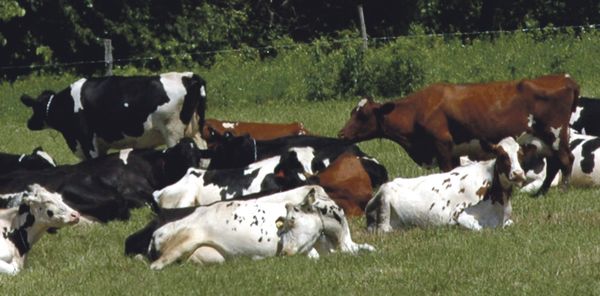Subscriptions
Menu
Advertisements
Things are awful: Drink more milk
6/17/2009 |
By Patsy Nicosia |

Economically speaking, things have never been this bad in the dairy industry and even the experts are at a loss as to when things will start turning around.
Or how many farms will be lost.
In many respects, said Dave Balbian, regional dairy marketing specialist for Cornell Cooperative Extension, the squeeze is a reflection of what’s going on in the national and global economies.
Credit is tight, equity—cows and real estate—is worth less, and the cost of feed and fuel are higher than normal.
The difference is that you can’t turn cows “off,” Mr. Balbian said, even when you’re getting paid an average of $12 for a hundred pounds of milk—milk that you need to be getting $17 for just to break even.
“People are doing what they can, but for most, it means no capital investments, stuff’s not getting replaced.
“The cost of production is just well below what people need to survive.”
The “why” behind the poor prices is almost a reverse of what happened in 2007 and early ’08, Mr. Balbian said.
At that time, the international and US economies were booming, dairy exports were at a record high, and severe droughts in New Zealand and Australia cut milk production there.
As a consequence, many farms had money to invest—and production ramped up.
Now, much of the world economy is in a shambles, Mr. Balbian said and New Zealand and Australia are making milk again, and though they’re down from where they were, fuel and feed prices are still at historic highs.
“Some people have gone out of business because they can’t get the credit they need,” Mr. Balbian said.
“Others who were in a strong enough financial position to pre-pay some things like crop expenses or feed, pretty soon that will be used up—and the credit won’t be there.
“People are comparing this to the Great Depression and it’s accurate. Long-term…I don’t know.”
If there’s any silver lining, Mr. Balbian said, it’s that if someone wants to go into dairy farming, cows are half as expensive as they were a year and a half ago and real estate is less expensive as well.
“”I’ve worked with a few people who still want to farm,” he said. “For someone in the right situation—maybe a small farm with off-farm economy, where the land has been in the family for years and just hasn’t had cows on it, it could be an opportunity.”
Though an uncertain one.
Mr. Balbian said dairy economists have been predicting a mid-year milk price of $15-$16 per hundred pounds—still below the cost of production—but now they’re saying that will come later rather than sooner.
“And no one’s talking about 2010,” he said.
Schoharie County Agricultural Marketing Specialist Michele Strobeck pointed out the dairy pricing system is difficult for consumers to understand—especially when they’ve seen very little change in what they pay for milk in the store.
According to data released from State Ag & Markets, she said, consumer prices have dropped 19 percent; farmers’ 52 percent.
“Farmers are currently being paid less than $1 for each gallon of milk, while it costs them $2 to produce it,” Ms. Strobeck explained.
In May. Schoharie County’s Board of Supervisors passed a resolution supporting te Specter-Casey Senate Bill, also called the Market Improvement Act of 2009, as the only proposed legislation addressing the core issues facing the industry.
“Farmers aren’t looking for a government bailout or additional subsidies, but they are asking for the federal government’s assistance to establish a fair market value for their product based on the cost of production,” Ms. Strobeck said.
Supporters can contact Secretary of Agriculture Tom Vilsack by going to www,farmaid.org and clicking on the link, “Take Action Now.”
But not everyone’s supporting it.
Cobleskill dairyman and former Farm Bureau director John Radliff said the bill’s so faulty that not even Senator Arlen Specter is pushing it.
“Nor is Farm Bureau,” he said. “We have policy in opposition to some parts of it, so we can’t support it.”
Mr. Radlfiff said he’s afraid the bill would in effect create a quota system that would tell producers how much milk they can make.
“I’m sure not going to give away my independence,” he said. “I’m totally opposed to the federal government telling me what I can produce.
“And when was the last time the government ever fixed anything?”









